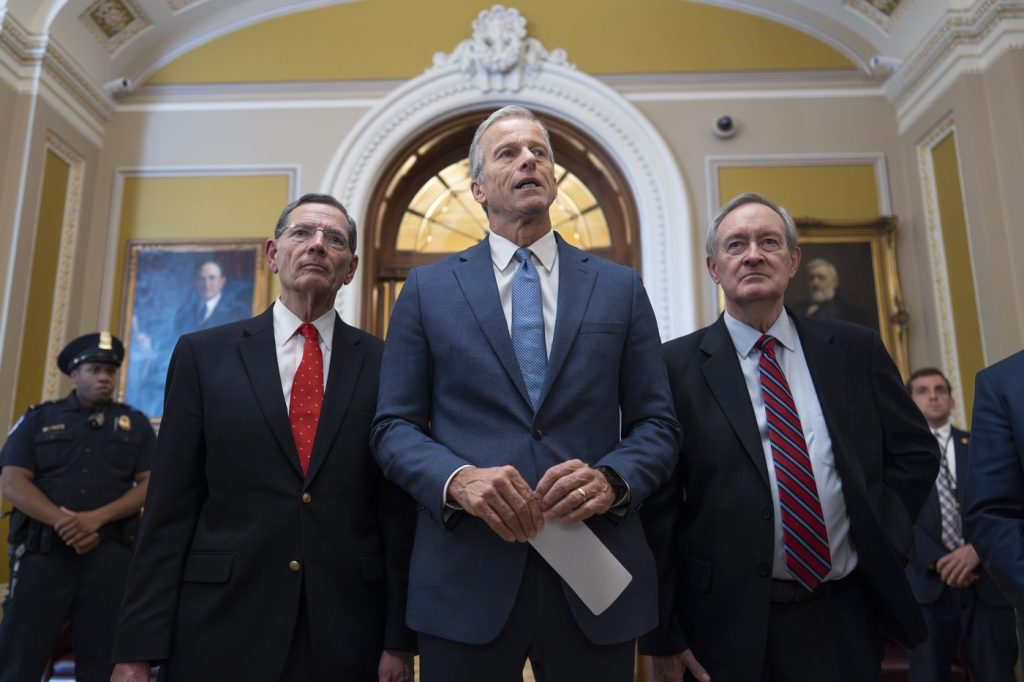WASHINGTON (AP) — An estimated 11.8 million adults and children may be at risk of losing their health insurance if the Republican domestic policy package, known as the “One Big, Beautiful Bill Act,” becomes law. The proposed changes will gradually reduce enrollment in federal health care programs like Medicaid and the Affordable Care Act (ACA) over the next decade, aiming to extract nearly $1 trillion from these essential health services.
The anticipated impacts could reverse the progress made in health insurance coverage in the U.S., particularly after years of increasing enrollment combined with federal funding for health care. Approximately 78 million individuals are currently enrolled in Medicaid, and 24 million rely on the ACA's marketplaces for their health insurance needs.
Medicaid operates as a federal-state program, managed by individual states, which may use different names for it—such as Medi-Cal in California, BadgerCare in Wisconsin, and MassHealth in Massachusetts. Under the GOP’s plan, significant changes could affect numerous enrollees, particularly through more frequent eligibility checks.
States will be required to verify income for Medicaid eligibility every six months. This change poses a risk for homeless or transient individuals who might miss critical government notifications for completing the necessary paperwork. Martha Santana-Chin, CEO of L.A. Care Health Plan, indicated that such populations may struggle with the increased administrative demands, resulting in loss of coverage if they fail to respond in time.
Historical examples show the potential harm of stringent rules. For instance, during Texas's income eligibility checks from 2014 to 2019, thousands of children lost their coverage. Critics have pointed out that excessive regulations in Texas contributed to its high rate of uninsured children.
Additionally, states will also be mandated to conduct more frequent checks on enrollees’ addresses and death records. For those in the ACA marketplace, scrutiny over reported incomes will be heightened, with penalties for individuals who earn more than expected when they originally applied for coverage. This policy stands in stark contrast to employer-based health plans, where re-enrollment occurs automatically each year unless individuals choose to opt out.
Another aspect of the plan involves children’s access to health care. States will gain the authority to delay enrollment in the Children’s Health Insurance Program (CHIP) under certain circumstances. Parents who are behind on premium payments may face temporary restrictions in securing coverage for their children. Premiums for this coverage can reach as much as $100 a month in some states. The previous Biden administration had prohibited such lockout policies, protecting access to necessary health services for children.
The bill also has repercussions for immigrants, as it tighterens criteria for receiving lower-cost Obamacare options. Refugees and asylum seekers may find it increasingly difficult to access healthcare, while states providing Medicaid to undocumented immigrants could face reduced federal funding. The contribution rate from the federal government for legal residents would decline from 90% to 80%, prompting some states to reconsider their Medicaid programs for immigrants altogether. This change has already resulted in California freezing new enrollments in its Medi-Cal program for all immigrants, with Illinois halting its own program as well.
The proposed new work requirements for Medicaid eligibility will likely lead to the most significant drops in coverage. Individuals between the ages of 19 and 64 will be obligated to work, volunteer, or attend school for 80 hours each month to qualify for Medicaid. Exemptions apply to those who are disabled, pregnant, or have a child aged 14 or younger. While some may opt not to sign up for Medicaid, experts indicate that most enrollees already manage work, school, or caregiving obligations that would exempt them. However, administrative complexities may still result in loss of coverage, as evidenced by a similar initiative in Arkansas, where 18,000 individuals were removed from Medicaid within just seven months due to bureaucratic challenges.
Lastly, millions of people enrolled in both Medicare and Medicaid may find application processes more challenging. The GOP bill aims to reverse streamlining measures put in place during the Biden administration, which had required states to automatically enroll people who qualify for supplementary income due to disabilities. Critics warn that this rollback could lead to additional paperwork burdens, increasing the risk that individuals will lose their health care coverage.











